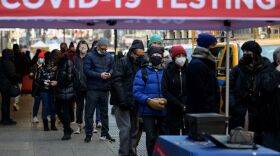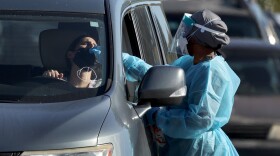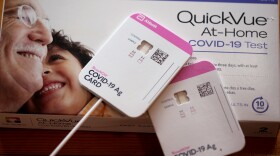
Mary Louise Kelly
Mary Louise Kelly is a co-host of All Things Considered, NPR's award-winning afternoon newsmagazine.
Previously, she spent a decade as national security correspondent for NPR News, and she's kept that focus in her role as anchor. That's meant taking All Things Considered to Russia, North Korea, and beyond (including live coverage from Helsinki, for the infamous Trump-Putin summit). Her past reporting has tracked the CIA and other spy agencies, terrorism, wars, and rising nuclear powers. Kelly's assignments have found her deep in interviews at the Khyber Pass, at mosques in Hamburg, and in grimy Belfast bars.
Kelly first launched NPR's intelligence beat in 2004. After one particularly tough trip to Baghdad — so tough she wrote an essay about it for Newsweek — she decided to try trading the spy beat for spy fiction. Her debut espionage novel, Anonymous Sources, was published by Simon and Schuster in 2013. It's a tale of journalists, spies, and Pakistan's nuclear security. Her second novel, The Bullet, followed in 2015.
Kelly's writing has appeared in the Wall Street Journal, The New York Times, The Washington Post, Politico, Washingtonian, The Atlantic, and other publications. She has lectured at Harvard and Stanford, and taught a course on national security and journalism at Georgetown University. In addition to her NPR work, Kelly serves as a contributing editor at The Atlantic, moderating newsmaker interviews at forums from Aspen to Abu Dhabi.
A Georgia native, Kelly's first job was pounding the streets as a political reporter at the Atlanta Journal-Constitution. In 1996, she made the leap to broadcasting, joining the team that launched BBC/Public Radio International's The World. The following year, Kelly moved to London to work as a producer for CNN and as a senior producer, host, and reporter for the BBC World Service.
Kelly graduated from Harvard University in 1993 with degrees in government, French language, and literature. Two years later, she completed a master's degree in European studies at Cambridge University in England.
-
Sick kids are crowding emergency rooms in parts of the country and some pediatric hospitals say they're running out of beds.
-
Jim Obergefell was the named plaintiff in the Supreme Court case that legalized same-sex marriage in 2015. He spells out why the LGBTQ+ community is so concerned about Roe v Wade.
-
In the face of rising COVID-19 cases, Dr. Bob Wachter of the University of California, San Francisco, offers reasons to be hopeful about the pandemic's outlook in the months ahead.
-
In the midst of record COVID case numbers in the U.S., biostatistician Natalie Dean walks us through how to assess the metrics.
-
The omicron situation seems to be changing so fast that it's hard to figure out which activities are safe on any given day. Two experts guide us through how to make a smart risk budget.
-
Harvard epidemiologist Michael Mina wants to increase availability of the at-home rapid tests the Biden administration is promoting. But he warns of a shortage without market competition.
-
Unless people are packed together, "there really just is not much spread happening outdoors," Dr. Ashish Jha of Brown University's School of Public Health says.
-
Former Education Secretary John King Jr. thinks a national tutoring program would help students make up for lost learning during the pandemic. He talked with NPR about the challenges facing schools.
-
Models developed by mathematical epidemiologists project that tens of thousands of lives across the U.S. can be saved by more people wearing face masks.
-
Lawyers for the former national security adviser cited "public frenzy" against him. Meanwhile, another congressional committee says Michael Flynn may have lied to security clearance investigators.










